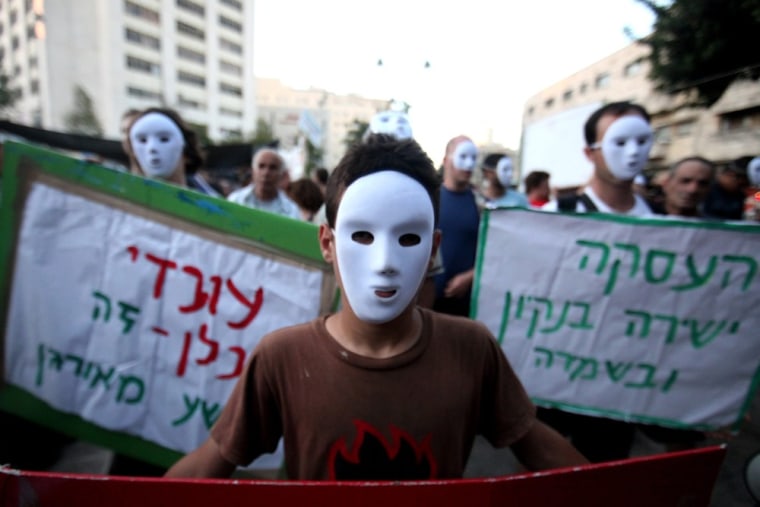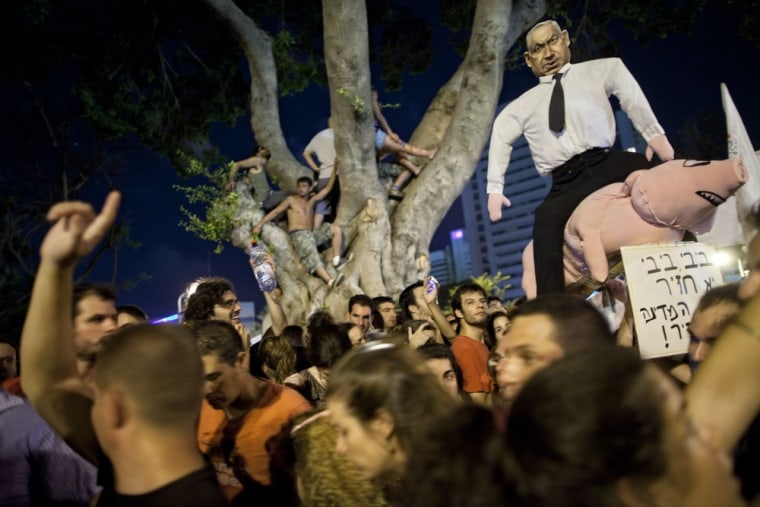They are mainstays of the society pages and glossy magazines. Some are praised for the hospital wings they have built, others are gossiped about for their quirks.
But these days, the handful of wealthy families who dominate the Israeli economy are assuming a new role: one of the chief targets of the tent-city protesters who have shaken Israel in the past month.
The “tycoons,” as they are known even in Hebrew, are suddenly facing enraged scrutiny as middle-class families complain that a country once viewed as an example of intimate equality today has one of the largest gaps between rich and poor in the industrialized world.
The tent-city protesters, who have shifted the public discourse by demanding affordable housing and other essential goods, issued a document this week calling for a new socioeconomic agenda. Topping their goals: “minimizing social inequalities.”
“What is keeping people on the streets is the question that if we are all having a hard time and we are all working and paying taxes, who is making the profits?” said Daphni Leef, the 25-year-old filmmaker who began this protest movement with a Facebook posting and remains at its center. “We know there are certain families that have a lot of money and a lot of influence and there is no transparency. People feel deceived.”
Those families — the Ofers, the Dankners, the Tshuvas, the Fishmans and others — account for the 10 biggest business groups in the country and together control some 30 percent of the economy. They will doubtless be among the targets at another set of street demonstrations planned for Saturday night.
“It is becoming clearer to more and more people that this issue of concentration of wealth has become more important,” said Einat Wilf, a legislator who submitted a bill last year aimed at tackling the issue. “As a result of the protests, there is much more political will to fight it than in the past.”
Others counter that wealth concentration is only one of a number of factors contributing to the current middle-class lament and that focusing on it exclusively diverts attention from other equally important matters.
They point to things like a swollen defense budget, subsidies for the ultra-Orthodox and the cost of settlements in the West Bank and East Jerusalem, where the Interior Ministry said Thursday that it would build 1,600 units and announced plans for 2,700 more.
Tycoons borrow heavily
But the issue has had strong populist resonance. Although Israel’s economy is strong, the data on wealth concentration, published by the Bank of Israel, are unsettling.
A small group of family-owned companies control banks, supermarket chains and media, cellphone and insurance companies. They borrow heavily, posing risks for the larger economy and, through a web of interconnecting enterprises, make it harder for others to get into the markets they dominate.
“These are called pyramid schemes because through shares in one company they take control of a second company and, through that, of another one on down a chain of holdings,” said Eytan Sheshinski, an economist at the Hebrew University of Jerusalem. “They are able to move profits through the pyramid, which cannot happen in the United States because of the tax system there.”
Still, the Bank of Israel study shows that while the United States, Britain and Germany have much less concentration of wealth than Israel, it is not so different from several other democracies. Based on the holdings of the 10 largest business families, Israel is in about the same situation as Switzerland, France and Belgium, and its wealth is far less concentrated than is the case in Sweden.
Last fall, Prime Minister Benjamin Netanyahu formed a committee to examine the concentration of wealth and find ways to reduce the power of monopolies.
“A pyramid is a tool to leverage heavily your capital, and retain control over large economic entities,” said Prof. Eugene Kandel, Mr. Netanyahu’s chief economic adviser, in an interview. “We know from looking at other countries that large and leveraged business groups can slow growth, cause instability and hinder competition. The committee appointed by Prime Minister Netanyahu works to prevent this from growing into a large-scale program in Israel.”

Daniel Doron, who directs the Israel Center for Social and Economic Progress, a pro-market research organization, said he was convinced that the way in which failing state assets were privatized in the 1980s and ’90s led to dangerous consolidation, just as it did in the former Soviet Union and some Arab countries, like Egypt and Syria.
Banks, construction and mining companies, all owned by agencies of the state and all in varying degrees of trouble, were sold to those who could afford to buy them.
'Rapacious elites fleecing consumers'
“It was basically selling assets to cronies,” Mr. Doron said. Once the economy started to pick up in the late 1990s, these companies used their powerful market positions to increase fees sharply, he said, adding, “Today, the whole Israeli economy is built on rapacious elites fleecing consumers.”
At the time of the sell-offs, some say, the right favored them for ideological reasons while the left wanted to get the economy out of the hands of the government, which the right often controlled.
The result — a limited number of individuals maintaining a hold over many national assets — has Israelis, both left and right, worried.
Perhaps the best example is Nochi Dankner, chairman of IDB Holdings. His group controls Super-Sol, the largest supermarket chain; Cellcom, the largest mobile phone company; Netvision, one of the largest Internet companies; and Clal Finance, one of the largest financial institutions. He just bought a controlling share of Maariv, one of the largest newspapers. Mr. Dankner declined to comment for this article.
Control of media companies, especially as they have become less profitable, is one aspect of wealth concentration that has many here especially concerned.
Commercial television stations are partly owned by tycoons, as are several of the newspapers. Sheldon Adelson, an American Jewish casino owner and friend of Mr. Netanyahu’s, publishes a free Israeli newspaper widely seen as promoting the prime minister’s agenda.
Guy Rolnik, editor of The Marker, a financial daily owned by Haaretz that has attacked concentration of wealth, said the issue had gotten short shrift in the media because of who owned the companies and fears of losing advertising. Often newspapers seem to be the tools of moguls battling one another as well as certain political figures.
A television journalist, who spoke on the condition of anonymity because of the delicacy of the matter, said his station would probably not do a program on wealth concentration to avoid upsetting the station’s owners.
But many of the moguls are somewhat to Mr. Netanyahu’s left on foreign policy, and their newspapers can be merciless on him. Other newspapers accuse the prime minister of being in bed with the rich. Still others say his focus on the tycoons is an attempt to draw attention away from the cost of settlements and his failed peace policies.
Mr. Netanyahu’s committee is expected to make recommendations in the next month or two.
They may include a change in the corporate tax code as well as antitrust regulations making it harder or illegal to own across sectors, resembling steps taken in the United States in the first half of the 20th century. But they will not recommend the kind of income redistribution many protesters are seeking.
“It used to be politically impossible to go after the cartels, but now that 300,000 people have gone out in the street, we have a mandate,” an aide to Mr. Netanyahu said. “But the prime minister is not going to make this a socialist country again.”
This story, "," originally appeared in The New York Times.
